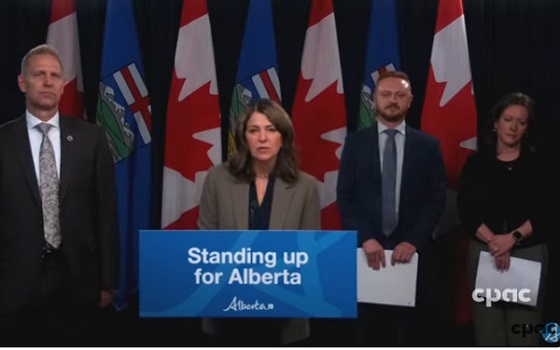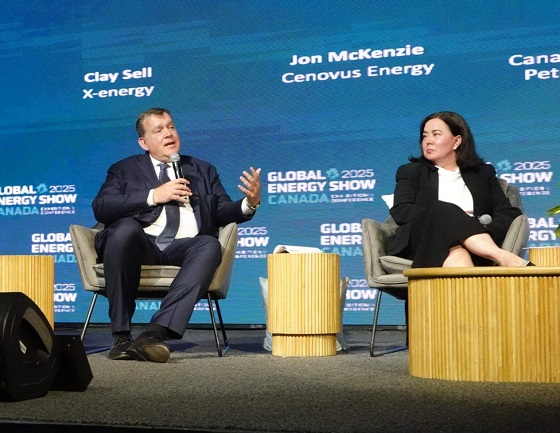Alberta
It’s On! Alberta Challenging Liberals Unconstitutional and Destructive Net-Zero Legislation

“If Ottawa had it’s way Albertans would be left to freeze in the dark”
The ineffective federal net-zero electricity regulations will not reduce emissions or benefit Albertans but will increase costs and lead to supply shortages.
The risk of power outages during a hot summer or the depths of harsh winter cold snaps, are not unrealistic outcomes if these regulations are implemented. According to the Alberta Electric System Operator’s analysis, the regulations in question would make Alberta’s electricity system more than 100 times less reliable than the province’s supply adequacy standard. Albertans expect their electricity to remain affordable and reliable, but implementation of these regulations could increase costs by a staggering 35 per cent.
Canada’s constitution is clear. Provinces have exclusive jurisdiction over the development, conservation and management of sites and facilities in the province for the generation and production of electrical energy. That is why Alberta’s government is referring the constitutionality of the federal government’s recent net-zero electricity regulations to the Court of Appeal of Alberta.
“The federal government refused to work collaboratively or listen to Canadians while developing these regulations. The results are ineffective, unachievable and irresponsible, and place Albertans’ livelihoods – and more importantly, lives – at significant risk. Our government will not accept unconstitutional net-zero regulations that leave Albertans vulnerable to blackouts in the middle of summer and winter when they need electricity the most.”
“The introduction of the Clean Electricity Regulations in Alberta by the federal government is another example of dangerous federal overreach. These regulations will create unpredictable power outages in the months when Albertans need reliable energy the most. They will also cause power prices to soar in Alberta, which will hit our vulnerable the hardest.”
Finalized in December 2024, the federal electricity regulations impose strict carbon limits on fossil fuel power, in an attempt to force a net-zero grid, an unachievable target given current technology and infrastructure. The reliance on unproven technologies makes it almost impossible to operate natural gas plants without costly upgrades, threatening investment, grid reliability, and Alberta’s energy security.
“Ottawa’s electricity regulations will leave Albertans in the dark. They aren’t about reducing emissions – they are unconstitutional, ideological activist policies based on standards that can’t be met and technology that doesn’t exist. It will drive away investment and punish businesses, provinces and families for using natural gas for reliable, dispatchable power. We will not put families at risk from safety and affordability impacts – rationing power during the coldest days of the year – and we will continue to stand up for Albertans.”
“Albertans depend on electricity to provide for their families, power their businesses and pursue their dreams. The federal government’s Clean Electricity Regulations threaten both the affordability and reliability of our power grid, and we will not stand by as these regulations put the well-being of Albertans at risk.”
Related information
- Conference Board of Canada socio-economic Impacts of Canada’s 2030 Emissions Reduction Plan – (April 2025)
- Alberta Electric System Operator’s position on Canadian Energy Regulations
Alberta
Alberta health care blockbuster: Province eliminating AHS Health Zones in favour of local decision-making!

Hospital Based Leadership: Eliminating the bureaucratic vortex in hospitals
Since Alberta’s government announced plans to refocus the health care system in November 2023, a consistent message has emerged from patients, front-line health care workers and concerned Albertans alike about the flaws of the prior system. Alberta Health Services’ current zone-based leadership structure is overly complex and bureaucratic. It lacks the flexibility and responsiveness needed to effectively support facilities and staff – particularly when it comes to hiring, securing supplies and adopting necessary technologies.
That’s why Alberta’s government is changing to a hospital-based leadership structure. On-site leadership teams will be responsible for hiring staff, managing resources and solving problems to effectively serve their patients and communities. Hospitals will now have the flexibility to respond, freedom to adapt and authority to act, so they can meet the needs of their facilities, patients and workforce in real time.
“What works in Calgary or Edmonton isn’t always what works in Camrose or Peace River. That’s why we’re cutting through bureaucracy and putting real decision-making power back in the hands of local hospital leaders, so they can act fast, hire who they need and deliver better care for their communities.”
“Hospital-based leadership ensures decisions on hiring, supplies and services are made efficiently by those closest to care – strengthening acute care, supporting staff and helping patients get the timely, high-quality care they need and deserve.”
“By rethinking how decisions are made, we’re working to improve health care through a more balanced and practical approach. By removing delays and empowering our on-site leaders, we’re giving facilities the tools to respond to real-time needs and ultimately provide better care to Albertans.”
AHS’ health zones will be eliminated, and acute care sites will be integrated into the seven regional corridors. These sites will operate under a new leadership model that emphasizes site-level performance management. Clear expectations will be set by Acute Care Alberta, and site operations will be managed by AHS through a hospital-based management framework. All acute care sites will be required to report to Acute Care Alberta based on these defined performance standards.
“Standing up Acute Care Alberta has allowed AHS to shift its focus to hospital-based services. This change will enable the local leadership teams at those hospitals to make site-based decisions in real and tangible ways that are best for their patients, families and staff. Acute Care Alberta will provide oversight and monitor site-level performance, and I’m confident overall hospital performance will improve when hospital leadership and staff have more authority to do what they know is best.”
“AHS is focused on reducing wait times and improving care for patients. By shifting to hospital-based leadership, we’re empowering hospital leaders to make real-time decisions based on what’s happening on the ground and respond to patient needs as they arise. It also means leaders can address issues we know have been frustrating, like hiring staff where they’re needed most and advancing hospital operations. This change enables front-line teams to act on ideas they see every day to improve care.”
The Ministry of Hospital and Surgical Health Services, Acute Care Alberta and Alberta Health Services will work collaboratively to design and establish the new leadership and management model with an interim model to be established by November 2025, followed by full implementation by summer 2026.
Quick facts
- Countries like the Netherlands and Norway, and parts of Australia have already made the shift to hospital-based leadership.
- The interim hospital-based leadership model will be implemented at one site before being implemented provincewide.
- Hospital-based leadership, once implemented, will apply only to AHS acute care facilities. Other acute care organizations will not be affected at the time of implementation.
Related information
Alberta
Alberta is investing up to $50 million into new technologies to help reduce oil sands mine water

Technology transforming tailings ponds
Alberta’s oil sands produce some of the most responsible energy in the world and have drastically reduced the amount of fresh water used per barrel. Yet, for decades, operators have been forced to store most of the water they use on site, leading to billions of litres now contained largely in tailings ponds.
Alberta is investing $50 million from the industry-funded TIER system to help develop new and improved technologies that make cleaning up oil sands mine water safer and more effective. Led by Emissions Reduction Alberta, the new Tailings Technology Challenge will help speed up work to safely reclaim the water in oil sands tailing ponds and eventually return the land for use by future generations.
“Alberta’s government is taking action by funding technologies that make treating oil sands water faster, effective and affordable. We look forward to seeing the innovative solutions that come out of this funding challenge, and once again demonstrate Alberta’s global reputation for sustainable energy development and environmental stewardship.”
“Tailings and mine water management remain among the most significant challenges facing Alberta’s energy sector. Through this challenge, we’re demonstrating our commitment to funding solutions that make water treatment and tailings remediation more affordable, scalable and effective.”
As in other mines, the oil sands processing creates leftover water called tailings that need to be properly managed. Recently, Alberta’s Oil Sands Mine Water Steering Committee brought together industry, academics and Indigenous leaders to identify the best path forward to safely address mine water and reclaim land.
This new funding competition will support both new and improved technologies to help oil sands companies minimize freshwater use, promote responsible ways to manage mine water and reclaim mine sites. Using technology for better on-site treatment will help improve safety, reduce future clean up costs and environmental risks, and speed up the process of safely addressing mine water and restoring sites so they are ready for future use.
“Innovation has always played an instrumental role in the oil sands and continues to be an area of focus. Oil sands companies are collaborating and investing to advance environmental technologies, including many focused on mine water and tailings management. We’re excited to see this initiative, as announced today, seeking to explore technology development in an area that’s important to all Albertans.”
Quick facts
- All mines produce tailings. In the oil sands, tailings describe a mixture of water, sand, clay and residual bitumen that are the byproduct of the oil extraction process.
- From 2013 to 2023, oil sands mine operations reduced the amount of fresh water used per barrel by 28 per cent. Recycled water use increased by 51 per cent over that same period.
- The Tailings Technology Challenge is open to oil sands operators and technology providers until Sept. 24.
- The Tailings Technology Challenge will invest in scale-up, pilot, demonstration and first-of-kind commercial technologies and solutions to reduce and manage fluid tailings and the treatment of oil sands mine water.
- Eligible technologies include both engineered and natural solutions that treat tailings to improve water quality and mine process water.
- Successful applicants can receive up to $15 million per project, with a minimum funding request of $1 million.
- Oil sands operators are responsible for site management and reclamation, while ongoing research continues to inform and refine best practices to support effective policy and regulatory outcomes.
Related information
-

 Health1 day ago
Health1 day agoLast day and last chance to win this dream home! Support the 2025 Red Deer Hospital Lottery before midnight!
-

 Aristotle Foundation1 day ago
Aristotle Foundation1 day agoThe Canadian Medical Association’s inexplicable stance on pediatric gender medicine
-

 conflict2 days ago
conflict2 days ago“Evacuate”: Netanyahu Warns Tehran as Israel Expands Strikes on Iran’s Military Command
-

 Energy2 days ago
Energy2 days agoCould the G7 Summit in Alberta be a historic moment for Canadian energy?
-

 Bruce Dowbiggin2 days ago
Bruce Dowbiggin2 days agoWOKE NBA Stars Seems Natural For CDN Advertisers. Why Won’t They Bite?
-

 Crime2 days ago
Crime2 days agoMinnesota shooter arrested after 48-hour manhunt
-

 Business1 day ago
Business1 day agoCarney’s Honeymoon Phase Enters a ‘Make-or-Break’ Week
-

 Alberta1 day ago
Alberta1 day agoAlberta announces citizens will have to pay for their COVID shots





